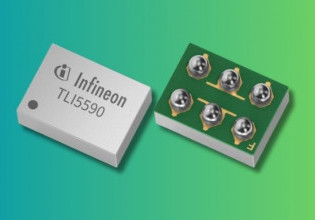Vishay T55 vPolyTan Polymer Capacitors | Tech Specs
Vishay’s T55 series of vPolyTan™ Polymer Tantalum Chip Capacitors go as low as 7 milliohms, have very low internal resistance, and can handle ripple current as high as 5.66 amps RMS.
This episode of Tech Specs is part of a video series highlighting the features, applications, and technical specs of newly-released products.
Vishay T55 vPolyTan Polymer Capacitors
If you need to minimize ESR, Vishay’s T55 series of vPolyTan™ Polymer Tantalum Chip Capacitors go as low as 7 milliohms. That’s 10 times lower than standard tantalum capacitors and is enabled by Vishay’s use of polymer cathodes in place of conventional manganese dioxide devices. The capacitors also have very low internal resistance and can handle ripple current as high as 5.66 amps RMS. Capacitors are offered from 3.3 to 1000 microfarads in 8 compact case sizes and are compatible with high volume pick-and-place equipment. Vishay’s T55 series capacitors are rated for operation from -55 degrees to +105 degrees, with voltage ratings from 2.5 to 63 volts DC. The wide range of sizes and ratings enables designers to use the capacitors in everything from networking and computer equipment to smartphones, tablets, and wireless cards.
- ESR as low as 7 mΩ (6 mΩ in development)
- Ripple current rating up to 5.66 ARMS
- Capacitance Range: 3.3 μF to 1000 μF, ±20% tolerance
- Case sizes: J, P, A, B, T, D, V, and Z
- Operating Temperature: -55°C to +105°C
- Voltage Rating: 2.5 VDC to 63 VDC
New Industry Products are a form of content that allows industry partners to share useful news, messages, and technology with All About Circuits readers in a way editorial content is not well suited to. All New Industry Products are subject to strict editorial guidelines with the intention of offering readers useful news, technical expertise, or stories. The viewpoints and opinions expressed in New Industry Products are those of the partner and not necessarily those of All About Circuits or its writers.






